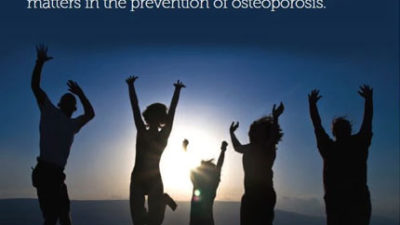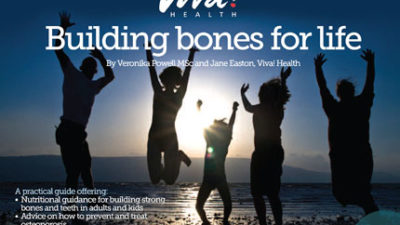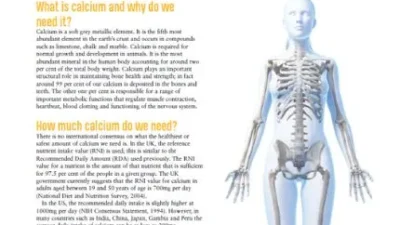Bone health

In order to grow up big and strong with healthy bones you need to drink milk and eat lots of dairy products, right? So why do countries that consume the most dairy have the highest rates of osteoporosis and fragile bones? Viva! Health’s ‘Break Free’ campaign destroys the myths and shows what really matters for healthy bones.

Do we need dairy for strong bones?
We’re told constantly that dairy products contain calcium but the other part of the equation is never mentioned – they also contain animal protein and the acid this creates in your body may, in certain circumstances, outweigh the benefits of the calcium. The overall effect is to acidify your body which as a result, uses up more calcium to neutralise the acid than the dairy products provide. Research shows that if you have enough calcium in your diet (from green vegetables, pulses, nuts and seeds etc) dairy products do not offer any benefit for bones.
Of course we need calcium to have healthy bones but most of all we need the right acid-alkali balance and, as many studies show, plant-based diets are not only more alkalising than meat and dairy-based diets can ever be but they also provide the whole ‘package’ of nutrients needed for healthy bones. It includes vitamins A, C, K and the B group as well as important minerals – calcium (enough for our daily needs), magnesium, potassium, selenium, boron, iron, copper, zinc, etc.
Osteoporosis
Osteoporosis – or brittle bone disease – affects millions of people around the world. In the UK alone, almost three million people have it. Osteoporosis has two main characteristics: low bone density and deterioration of bone structure. Together, these result in fragile bones and an increased risk of fractures. It’s estimated that in the UK, one in two women and one in five men will suffer a fracture after the age of 50.
The UK is one of the countries with the highest rates of osteoporosis and also one of the biggest consumers of dairy and other animal products. Even the World Health Organisation’s recommendations for preventing osteoporosis acknowledge this ‘calcium paradox’ as they call it – that some countries with the highest intake of dairy also have the highest rates of osteoporosis.
A number of studies show that calcium and vitamin D supplements, often recommended for better bone health, are not effective in preventing fractures. Osteoporosis is not a disease simply caused by a lack of calcium, therefore just adding more calcium into your system won’t help. Osteoporosis develops when the rate of bone loss is consistently higher than the rate of new bone formation which leads to a bone density deficit. This can be caused by acids formed in the body as a result of long-term consumption of acid-forming foods which are responsible for calcium being leached from the bones. Consumption of large amounts of calcium does not simply return the calcium into the bones.
Science is rapidly coming to the conclusion that a diet high in alkalising plant foods, coupled with regular weight-bearing exercise, is the way to grow healthy bones and preserve them. Forget the white milk moustache – it should be green!
See our scientific report, easy-to-read guide and fact sheet for more information.








